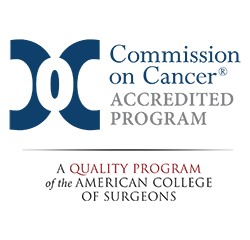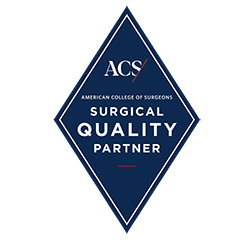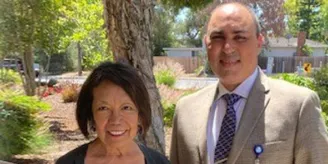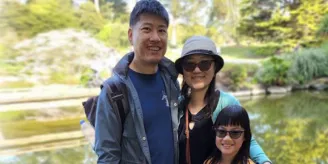Symptoms & Diagnosis
You may be at risk of lung cancer if you’ve smoked previously or been exposed to secondhand smoke. Exposure to other environmental toxins and harmful substances — like air pollution, radon, asbestos, talc and other chemicals — can also increase your risk. Avoiding these dangerous materials can help lower your chances of developing lung cancer, though it is possible to develop cancer even without these risk factors. If you have been exposed to any of these substances, take our Cancer Risk Assessment to learn more about your risk of developing lung cancer.
While early-stage lung cancer may not cause symptoms, more advanced cancer can feel like or lead to:
- A cough that doesn't go away and gets worse over time
- Constant chest pain
- Coughing up blood
- Shortness of breath, wheezing or hoarseness
- Recurring pneumonia or bronchitis
You know your body better than anyone. If you are feeling any lung cancer symptoms, don’t hesitate to reach out to your doctor so we can learn more about what might be causing them.
If you’re considered at high risk for developing lung cancer, we offer screening services, including a Low Dose CT Lung Cancer Screening and free lung cancer screenings to eligible patients. Other screenings for lung cancer may include a standard chest X-ray and sputum sample (mucus or phlegm you cough up for further study under a microscope). Your doctor may also recommend a bronchoscopy (scope procedure to look into the lungs) or CT scan in some cases.
If your doctor finds a suspicious nodule during one of these tests or if you are at high risk for lung cancer, they may recommend the Lung Nodule Program to closely monitor these growths and recommend action if they become harmful.
Different types of lung cancer require different treatments, which means an accurate diagnosis is crucial. We use advanced imaging techniques to gather precise information to more accurately find the type and stage of your lung cancer. These techniques include:
- Endobronchial ultrasound. This is a procedure where we take tiny tissue samples from lymph nodes in the chest to determine the type and stage of your lung cancer.
- Navigational bronchoscopy. This new technique allows for a biopsy of nodules in the chest that we can’t reach with traditional bronchoscopy. We direct a tiny catheter to a nodule anywhere in the lung during a minimally invasive surgical procedure.
If the results of these exams are abnormal, we refer you for a cancer consultation with an oncologist who has experience treating lung cancer. This expert reviews your test results and medical history to learn more about your diagnosis and form a treatment plan tailored to your needs.
We know learning you have lung cancer can feel scary. That’s why we are committed to seeing you for a cancer consultation as quickly as possible — often within 48 hours — after your diagnosis so we can discuss treatment options, order additional tests and address any questions without delay.
Treatments
There are many kinds and stages of lung cancer that may require different treatments. You deserve a personalized care plan tailored to your needs and your type of lung cancer. Each week, the Cancer Care team convenes a tumor board that brings together experts from across disciplines to collaborate on customized care plans for you. This collaboration has one common goal — to make sure you get the best possible care. Our multidisciplinary team of specialists, including surgical, medical and radiation oncologists who collaborate with pulmonologists, interventional pulmonologists, thoracic surgeons, pathologists and radiologists, is here to care for you through every part of your treatment.
Surgery
You may be a candidate for lung cancer surgery to remove part or all of your lung. If you have an early-stage lung cancer tumor, our lung surgeons can perform a minimally invasive procedure to remove it. For larger tumors, your surgeon makes an incision on the side of the chest to reach and remove the tumor.
Radiation
Radiation oncologists at our Radiation Treatment Center have treated thousands of patients with different types of cancer. Our team of experts uses state-of-the-art radiation treatments, including stereotactic radiosurgery, adaptive radiation therapy and intensity-modulated radiation therapy, to treat lung cancer with speed and precision. Our radiation oncologists were also the first in the world to use a robotic-assisted procedure for brachytherapy (implantation of radioactive seeds next to your tumor) to treat lung tumors. These advanced therapies offer the most effective results while preserving your healthy tissue and limiting side effects.
Chemotherapy
Depending on the stage of your cancer, chemotherapy may be a first-line lung cancer treatment or an addition to other therapies. We work with you to determine if chemotherapy is a good option for your lung cancer and collaborate to find the right combination of anticancer drugs, anti-nausea medicine and pain medication for your needs.
We’ve also had success using targeted drugs to treat non-small cell lung cancer — the most common form of lung cancer. El Camino Health is at the forefront of community hospitals using this treatment, which involves analyzing your lung tumor to learn about its protein and chemical makeup, then finding which drugs will have the greatest impact fighting it.
Clinical Trials
We participate in research to find new ways to detect, cure and ease treatment for lung cancer. We collaborate with other medical centers and the National Cancer Institute on lung cancer clinical trials ranging from new kinds of immunotherapy to innovative chemotherapy to advanced radiation approaches. If you’re interested in participating in this leading-edge research, talk to your care team to find a study that’s right for you.
Cancer Awards & Accreditations
Our superior Cancer Care has earned us a three-year accreditation as a comprehensive community cancer program from the Commission on Cancer of the American College of Surgeons (ACS). Accreditation ensures that the care you receive right here in your community is high-quality and uses evidence-based, national treatment guidelines.
We’re also an ACS Surgical Quality Partner and committed to the highest surgery standards.
Patients rate us highly, too. Based on PressGaney patient satisfaction surveys, our “likeliness to recommend” score is over 90%, and we’ve won the top patient experience award multiple years in a row.
 |  |

